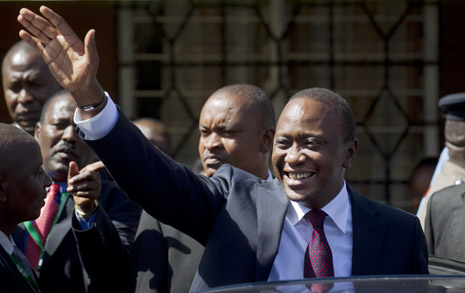Today I went to a forum organized by the Heinrich Boell Foundation that aimed at auditing the first 100 days of Mr. Uhuru Kenyatta’s Jubilee government. The benchmark of the audit being of course the more than utopic manifesto that Mr. Kenyatta and his running mate William Ruto served Kenyans as their election promises.
The Jubilee government is a government, ‘slightly bewildered by its fortune.’ President Kenyatta and his Deputy President, William Ruto have gone through thick and thin to be at the helm of Kenya’s leadership; their charges at the International Criminal Court for war crimes related charges, numerous court cases challenging their eligibility to run for office in the March, 4th 2013 and the subsequent challenge of the election results in the Supreme court of Kenya. To this day the president and his deputy have not gained legitimacy to large sections of Kenyans because of the ‘bungled’ nature of the elections. Their good fortune notwithstanding, the president and the deputy president have to, wake up and smell the coffee and realize that many Kenyan’s look unto them to deliver Canaan.
There is general acquiesces that the duo face stacked up challenges, especially given that they are in charge of the first government that is fully charged with the implementation of the 2010 constitution. Kenyans will expect no excuses for slackness in governance and expect the duo to achieve. As one of the panelists noted, the Jubilee government has quickly come to terms with the fact that the two are very different things.
A snapshot of the Jubilee manifesto exposes some of the colossal promises they promised Kenyans, in their manifesto with three key pillars, Umoja (togetherness), Uchumi (economy) and Uwazi (openness). The jubilee government promised many a thing, including; the abolition of maternity fees, a free laptop for every entry level primary school child, openness in governance, regional equity in governance and a horde of many other issues that are more futuristic than humans on the surface of planet. These promises in their promises form the basis of scoring the jubilee government for the first century of days that it has been in power.
The most nagging challenge that the Uhuru government faces comes in the area of devolution. Some distracters in the opposition have already branded him an anti-reformer especially after he accented to the Division of Revenue Bill (2013) which was protracted by the; National Assembly, seen by many as the ’anti-devolution house’ and the Senate, seen by many as the ‘pro-devolution house.’ There was general consensus especially after the Uhuru’s signing of the bill that he was systematically emasculating devolution by underfunding it.
Mr. Mugo kibati the Director General of Vision 2030, Kenya’s premier development blueprint urged caution when he said that, ‘the transfer of functions of unsystematically from the central government to the county governments shall have unbearable consequences on the Kenyan state. Because Kenyan’s are perpetually fixated on elections, decision making and policy implementation in this country are happening in a milieu of the dark shadow of the 2017 election,” Phew! As Kipchumba Murkomen the Jubilee Senator of Elgeyo Marakwet put it, Uhuru and Ruto and the Governors need to implement policy for posterity’s sake rather than for re-election.
The Uhuru government also received thumbs down for their handling of the security situation. Since the Jubilee government came to power there have been skirmishes in Bungoma in the West, and Mandera in the North. Squabbling between the Independent office of Police Oversight Authority and the office of the Inspector General of Police Mr. David Kimaiyo has not helped the situation one bit. The amorphousness operational command in the police force is making the police force ill adapted to provide security.
The Uhuru government has also received criticisms for its cabinet population. Mr. Uhuru and Mr. Ruto and perhaps in keeping with African traditions have been accused of banishing into oblivion people from communities that are apathetic to their political course. People from Luo Nyanza, Ukambani the two communities where Raila Odinga and Kalonzo Musyoka come from and the main archenemies of the Jubilee’s coalition have been particularly thin in government appointments. Though the Uhuru and Ruto government will argue that they have been in more inclusive by factoring in more minority communities from the rest of Kenya.
Although Uhuru’s government is fraught with incessant challenges, there’s quite an ambivalence on whether one should be optimistic or pessimistic. Are we on the track with the light at the end of the tunnel or the dark tunnel without an end?
Alex Ndungu Njeru wrote in from Kenya



